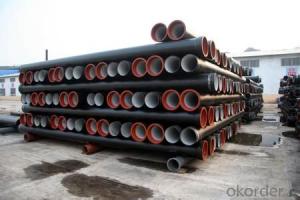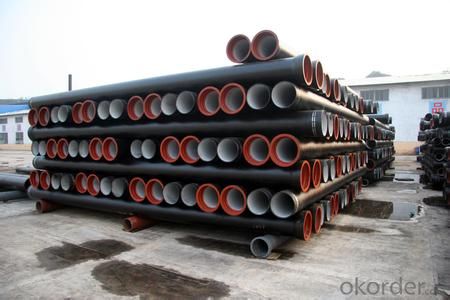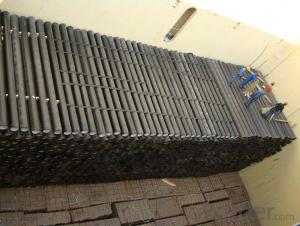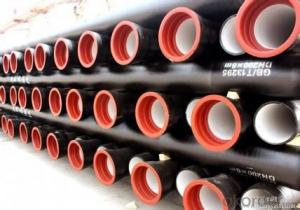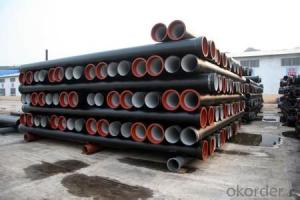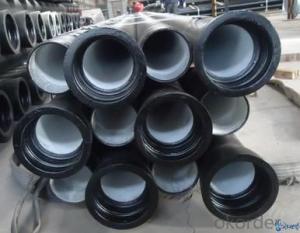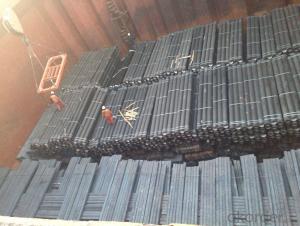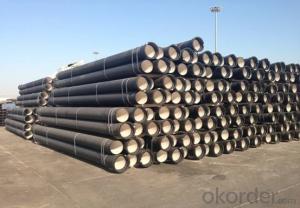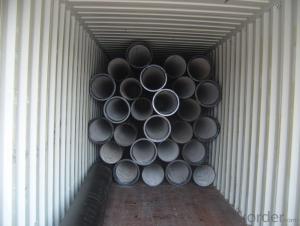DUCTILE IRON PIPE C Class DN250
- Loading Port:
- China Main Port
- Payment Terms:
- TT OR LC
- Min Order Qty:
- -
- Supply Capability:
- -
OKorder Service Pledge
OKorder Financial Service
You Might Also Like
Ductile Iron Cast Pipe is without any defects compare with tradition casting tech, which has many advantages particularly as follow:
(1) High density. In the "vertical upward casting" process, the melt iron of centre liquid column in center crystallizer is continuously feeding for volume shrinkage caused by condensation tube at outer circumference , which lead to be free of shrinkage porosity.
(2) High purity. When melt iron pouring, the mixed impurities such as gas, dross, sand grain which are lighter than melt iron could be eliminated at furnace mouth, its impossible to enter into the crystallizer through the channel, so the melt iron into the crystallizer is very pure.
(3) Strength with toughness. The cooling speed provided by continuous crystallizer is 30 times than sand casting and 5 times than centrifugal casting, and doesn't produce white iron, the eutectic cell volume of continuous cast iron is one eighth to one tenth compare with traditional cast iron. The density of graphite nodule in ductile iron can reach 300-700 pcs/mm2. Therefore, all reason above improve the strength and toughness of continuous cast iron.
(4) Free machining. The high speed cooling make the hardening phase (such as boride, steadite) not appear like reticular, massive or thick, but diffuse like fish bone and pane in shape, moreover, there are tiny graphite flakes inlaid hardening phase. It's free machining in BrinellHardness the range of 250-300HB. However, the Brinell Hardness of 250 is top limit to common metal materials.
(5) Uniform composition of tube wall. The convection mixing of liquid column caused by marching type drawing in crystallizer make the composition of tube wall well-distributed, and concentration gradient very little.
(6) High productivity. To the wall thickness of tube under 10mm, the speed of continuous casting is 1 meter/min, to the wall thickness of tube under 20mm, the speed of continuous casting is 0.5 meter/min, which is high efficiency that centrifugal or other casting tech couldn't reach.
- Q: What is the expected burst pressure of ductile iron pipes?
- Several factors, including the diameter, wall thickness, and grade of ductile iron, can influence the expected burst pressure of ductile iron pipes. However, ductile iron pipes are typically designed and manufactured to withstand high-pressure loads. Typically, the expected burst pressure of ductile iron pipes ranges from 350 psi to 700 psi. It is important to note that this is a general range, and the actual burst pressure can vary depending on the specific design and manufacturing standards followed. To determine the exact expected burst pressure for a specific ductile iron pipe, it is advisable to refer to the manufacturer's specifications or relevant industry standards such as the American Water Works Association (AWWA) C150 or ISO 2531. These guidelines provide recommendations for ductile iron pipes and their performance under different conditions. Additionally, local building codes and regulations may also include specific requirements for the installation of ductile iron pipes.
- Q: How does ductile iron pipe handle soil movements and settlements?
- Ductile iron pipe has gained a reputation for effectively managing soil movements and settlements. Its ability to accommodate ground shifts and settling without compromising its structural integrity is attributed to its flexibility and durability. A notable characteristic of ductile iron pipe lies in its inherent strength and resilience. It can endure external pressures and stress caused by soil movements, including lateral forces and ground settlement. This is due to its high tensile strength, which enables it to resist deformation and maintain its shape even under substantial loads. Furthermore, the flexibility of ductile iron pipe plays a crucial role in its capacity to handle soil movements. The pipe's natural flexibility allows it to absorb the impacts of ground shifts and movements without fracturing or breaking. It can bend and adjust to changes in the surrounding soil, minimizing the risk of pipe failure or leakage. Additionally, the joint design of ductile iron pipe contributes to its effectiveness in managing soil movements and settlements. The installation employs a push-on joint system that permits some movement and settlement without compromising the overall integrity of the pipeline. The joints can absorb and distribute stress and movement, minimizing the risk of pipe failure. In conclusion, ductile iron pipe excels in managing soil movements and settlements. Its strength, flexibility, and joint design enable it to withstand external pressures resulting from ground shifts, settling, and other soil movements. As a result, ductile iron pipe is a reliable choice for a range of applications where soil movement is a concern.
- Q: Can ductile iron pipe be used for mining applications?
- Yes, ductile iron pipe can certainly be used for mining applications. Ductile iron is a type of cast iron that exhibits significant tensile strength, flexibility, and durability, making it suitable for demanding and rugged environments like mining. Its high strength-to-weight ratio allows for easy handling and installation, making it a cost-effective choice for mining operations. Ductile iron pipes are resistant to corrosion and have excellent mechanical properties, including high impact and fatigue resistance. These properties make them ideal for transporting various materials commonly found in mining, such as water, slurries, and abrasive ores. Additionally, ductile iron pipes have a long lifespan, ensuring reliable performance and minimal maintenance requirements in mining operations. Furthermore, ductile iron pipes can withstand high pressures and maintain their integrity under extreme conditions, making them suitable for underground mining applications. They can handle the demanding requirements of deep mining operations, including the transport of water for cooling or dust suppression, as well as the drainage of wastewater or mine dewatering. Overall, ductile iron pipes provide the necessary strength, resilience, and corrosion resistance required for mining applications. Their versatility, durability, and ease of installation make them a valuable choice for mining operations, ensuring efficient and reliable material transport while minimizing downtime and maintenance costs.
- Q: Are ductile iron pipes suitable for use in wastewater pumping stations?
- Indeed, in wastewater pumping stations, ductile iron pipes exhibit suitability. Ductile iron, a resilient and robust substance, possesses the capacity to endure the demanding circumstances and corrosive properties of wastewater. With its exceptional resistance to corrosion and ability to withstand high-pressure settings, ductile iron pipes represent an optimal selection for the conveyance of wastewater within pumping stations. Notably, these pipes boast an extended lifespan and necessitate minimal maintenance, thereby reducing operational expenses and guaranteeing dependable and effective wastewater transportation.
- Q: What are the different methods for tapping ductile iron pipe?
- There are several different methods for tapping ductile iron pipe, depending on the specific requirements of the project. Some of the common methods used include: 1. Mechanical Tapping: This method involves using a mechanical tapping machine to create a hole in the ductile iron pipe. The machine is equipped with a cutting tool that rotates and cuts through the pipe wall, creating a clean hole. This method is commonly used for smaller diameter pipes and is relatively quick and efficient. 2. Hot Tapping: Hot tapping involves creating a hole in a pressurized ductile iron pipe while it is still in service. This method requires specialized equipment and expertise to ensure safety and maintain the integrity of the pipe. Hot tapping is commonly used when it is not feasible or practical to shut down the pipeline for maintenance or repair work. 3. Electrofusion Tapping: Electrofusion tapping is a method that uses an electrofusion saddle and fitting to create a branch connection on a ductile iron pipe. This method involves welding a fitting onto the pipe using an electrofusion machine, which creates a secure and leak-proof connection. Electrofusion tapping is commonly used for larger diameter pipes and is suitable for both water and gas applications. 4. Saddle Tapping: Saddle tapping involves attaching a saddle or clamp onto the ductile iron pipe and drilling a hole through the saddle into the pipe. The saddle is then equipped with a threaded outlet for connecting a branch line. This method is commonly used for smaller diameter pipes and is relatively simple and cost-effective. 5. Split Sleeve Tapping: Split sleeve tapping is a method that involves cutting a section out of the ductile iron pipe and installing a split sleeve over the cut. The split sleeve is then bolted together, creating a secure and watertight connection. This method is commonly used for larger diameter pipes and is suitable for both water and gas applications. It is important to note that the selection of the tapping method should be based on factors such as the pipe size, pressure rating, required branch connection, and the specific requirements of the project. Consulting with a professional engineer or tapping specialist is recommended to ensure the proper method is used for tapping ductile iron pipe.
- Q: What is the expected service life of ductile iron pipe?
- The service life of ductile iron pipe can vary depending on several factors, including the environment, soil conditions, water quality, and the implementation of maintenance and corrosion protection measures. On average, ductile iron pipe is designed to last between 75 and 100 years, thanks to its exceptional strength, durability, and resistance to corrosion. This type of pipe is renowned for its ability to withstand harsh conditions, making it a popular choice for water and wastewater systems, industrial applications, and various infrastructure projects. By regularly maintaining and properly protecting against corrosion, the service life of ductile iron pipe can be extended, ensuring its reliability and performance for many decades to come.
- Q: What are the different pressure classes available for ductile iron pipes?
- Ductile iron pipes come in various pressure classes that are commonly used for water and wastewater purposes. These pressure classes, namely Class 150, Class 200, Class 250, Class 300, and Class 350, indicate the maximum pressure in psi that the pipes can withstand. For instance, Class 150 pipes have a maximum working pressure of 150 psi, while Class 200 pipes can handle up to 200 psi. Class 250 pipes can withstand pressures up to 250 psi, and Class 300 pipes have a maximum working pressure of 300 psi. Lastly, the highest pressure class, Class 350, can handle pressures up to 350 psi. The selection of the appropriate pressure class for a ductile iron pipe depends on several factors, including system design, fluid characteristics, and operating conditions. To determine the suitable pressure class for a specific application, it is crucial to consult relevant standards and guidelines, such as those provided by the American Water Works Association (AWWA). It is important to note that these pressure classes refer to the working pressure of the pipe, which is the pressure the pipe is designed to safely contain during normal operation. To ensure compliance with the required pressure class standards, the pipes are typically tested and certified.
- Q: Are there any special considerations for installing ductile iron pipe in rocky soils?
- Installing ductile iron pipe in rocky soils presents various special considerations. First and foremost, the excavation process can be a challenge due to the presence of rocks. Trenching becomes more difficult and time-consuming, requiring specialized equipment to break through the rocks and create a suitable trench for the pipe installation. Furthermore, the rocky soil can cause abrasion and damage to the outer surface of the ductile iron pipe during installation. This poses a potential risk to the integrity of the pipe, leading to leaks or breakages in the future. To mitigate this risk, it is advisable to utilize protective measures such as rock shields or padding around the pipe, minimizing direct contact with the rocks. In addition, the presence of rocks can impact the backfilling process. Proper backfilling is essential to provide support and stability to the installed pipe. However, rocks can hinder the proper compaction of the backfill material, resulting in uneven support and potential movement of the pipe. Therefore, it is crucial to carefully select and place the backfill material, ensuring it is free from larger rocks and adequately compacted to provide sufficient support. Moreover, the rocky soil can also affect the installation of fittings and joints. The hardness of the rocks can make it challenging to align and connect the pipe with fittings or create secure joints. Therefore, extra care must be taken during the installation process to ensure proper alignment and secure connections, preventing leaks and ensuring the long-term functionality of the ductile iron pipe system. In conclusion, installing ductile iron pipe in rocky soils demands special attention to overcome challenges related to excavation, abrasion, backfilling, and fitting installation. By taking these factors into account and implementing appropriate measures, the installation process can be carried out successfully, allowing the pipe system to operate effectively even in rocky soil conditions.
- Q: How are ductile iron pipes protected against stray current corrosion?
- Various preventive measures and protective coatings are employed to safeguard ductile iron pipes from stray current corrosion. Stray current corrosion arises when an electric current flows through the pipe, causing accelerated corrosion and potential harm. To prevent this, the following measures are generally utilized: 1. Electrical isolation: Ductile iron pipes are insulated from other metallic structures by means of insulating materials like rubber gaskets or non-conductive coatings. This insulation obstructs the passage of stray current through the pipe, thereby minimizing the risk of corrosion. 2. Cathodic protection: Cathodic protection is a widely employed technique to shield ductile iron pipes from stray current corrosion. It involves installing sacrificial anodes or impressed current systems near the pipe. These anodes or systems emit a controlled electric current that counters the stray current and guarantees the cathodic protection of the iron pipe. 3. Coatings: Ductile iron pipes are typically coated with protective layers to enhance their resistance against corrosion. A common coating is fusion-bonded epoxy (FBE), which offers a high level of protection against stray current corrosion. FBE coatings act as a barrier, preventing electrical contact between the pipe and the surrounding environment. 4. Monitoring and maintenance: Regular monitoring and maintenance are essential for ensuring the ongoing protection of ductile iron pipes against stray current corrosion. This entails inspecting the protective coatings for any damage or deterioration and promptly repairing or replacing them as required. Additionally, monitoring systems can be installed to detect and measure stray currents, allowing for timely intervention if necessary. By implementing these protection measures, ductile iron pipes can effectively ward off stray current corrosion, thereby prolonging their lifespan and ensuring the integrity of the pipeline infrastructure.
- Q: Can ductile iron pipes be used for irrigation pivot systems?
- Yes, ductile iron pipes can be used for irrigation pivot systems. Ductile iron pipes have high tensile strength and durability, making them suitable for handling the pressure and load requirements of irrigation pivot systems. Additionally, their corrosion resistance makes them a reliable choice for long-term use in such applications.
Send your message to us
DUCTILE IRON PIPE C Class DN250
- Loading Port:
- China Main Port
- Payment Terms:
- TT OR LC
- Min Order Qty:
- -
- Supply Capability:
- -
OKorder Service Pledge
OKorder Financial Service
Similar products
Hot products
Hot Searches
Related keywords
